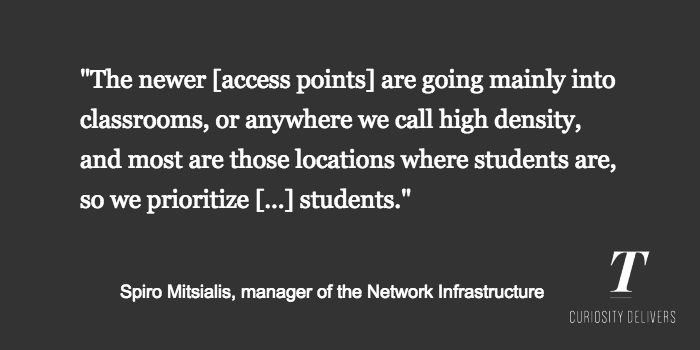The McGill Network Infrastructure Group plans to upgrade the campus wireless internet services at the beginning of next year. According to Spiro Mitsialis, manager of the Network Infrastructure, the last major upgrade was completed in 2006, but smaller upgrades to service are consistently made to ensure that it can provide for the volume of users on campus.
Mitsialis stated that the McGill campus sees a high number of users daily., the majority of whom connect to the internet with multiple devices.
“We have 30,000 concurrent users,” Mitsialis said. “[But] that doesn’t mean that’s all [individual] users […] because a lot of times a user has multiple devices. I think the industry average is about two and a half devices per user.”
According to Elliott Stekewich, Manager of Finance & IT Contracts at Information Technology Services (ITS), approximately $420,000 per year is spent on wireless and wired internet for the McGill network with an additional $50,000 per year spent on Wi-Fi for the MacDonald campus shuttle bus.
“Wireless access points—equivalent to a home wireless router—costs approximately $1,800 per access point ,” Stekewich said. “Each access point provides a coverage of eight metres radius and has an expected functional life span ranging from seven to 10 years. There are roughly 4,000 antennas presently at McGill.”
The McGill network is currently made up of older 2.4 Gigahertz frequencies and newer five Gigahertz frequencies. The five Gigahertz frequency provides faster and more stable connection.
“People should try to use the 5 Gigahertz as much as possible,” Mitsialis said. “We still have some holes in areas and sometimes we’ll get some complaints […] and when we find that there’s a hole, we fill it.”
Sam Hull, U1 Management, voiced concern that internet services can be slow in classrooms on campus.
“[The Wi-Fi is] generally pretty fast but in a lot of places it can be inconsistent,” Hull said. “That’s fine in certain areas but in classrooms it can be more of a problem—hopefully one the administration can deal with.”
Mitsialis stated that improving internet in classrooms will be a priority when the system is upgraded next year.
“The newer [access points] are going mainly into classrooms, or anywhere we call high density, and most are those locations where students are, so we prioritize […] students,” Mitsialis said. “I think I saw some stats a couple of years ago that said that 90 per cent of the users were students. ”
Norman Chu, Network Analyst at Network Infrastructure, stated that although the internet services for a university such as McGill are complex, the ITS is open to making improvements to the service whenever a complaint is received.
“There’s a lot more complexity that goes into running dozens of access points in an area versus a single one that most people have at home,” Chu explained. “That said […] I’d like to stress that if users do have an issue with their wireless connection, contact the ITS service desk to open a ticket and we’ll be glad to investigate on a case-by-case basis.”







